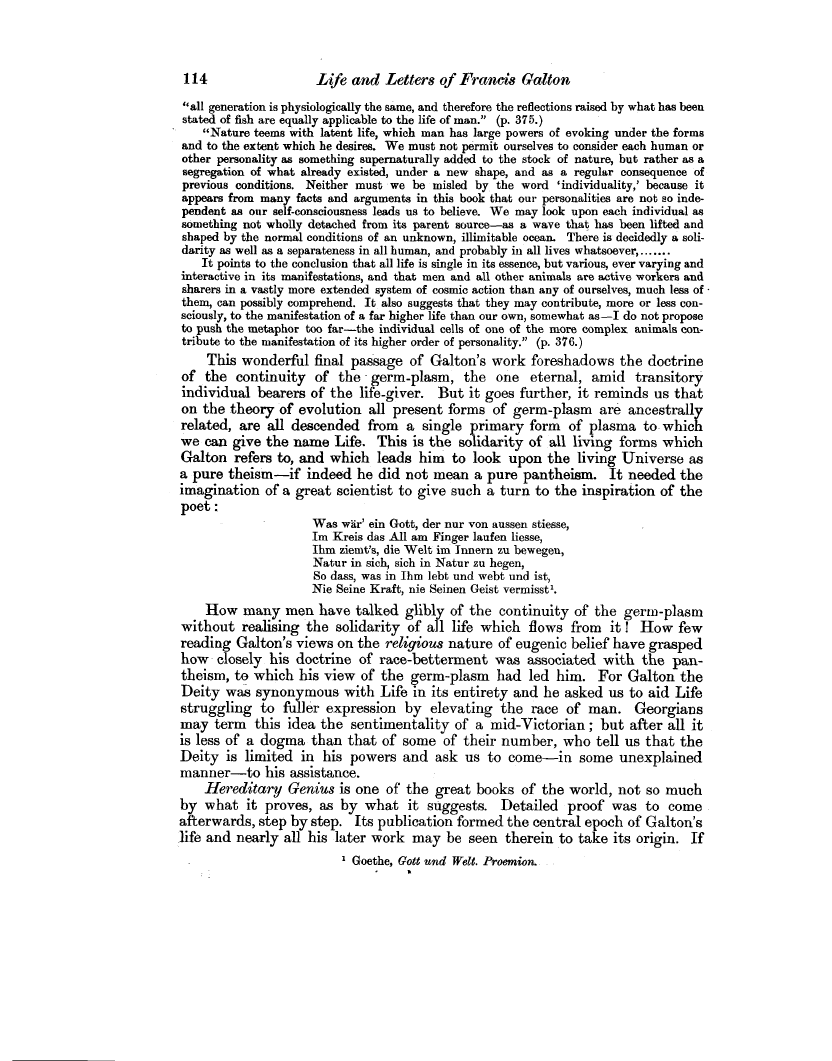114 Life and Letters of Francis Galton
"all generation is physiologically the same, and therefore the reflections raised by what has been stated of fish are equally applicable to the life of man." (p. 375.)
"Nature teems with latent life, which man has large powers of evoking under the forms and to the extent which he desires. We must not permit ourselves to consider each human or other personality as something supernaturally added to the stock of nature, but rather as a segregation of what already existed, under a new shape, and as a regular consequence of previous conditions. Neither must we be misled by the word `individuality,' because it appears from many facts and arguments in this book that our personalities are not so independent as our self-consciousness leads us to believe. We may look upon each individual as something not wholly detached from its parent source-as a wave that has been lifted and shaped by the normal conditions of an unknown, illimitable ocean. There is decidedly a solidarity as well as a separateness in all human, and probably in all lives whatsoever,
It points to the conclusion that all life is single in its essence, but various, ever varying and interactive in its manifestations, and that men and all other animals are active workers and sharers in a vastly more extended system of cosmic action than any of ourselves, much less of them, can possibly comprehend. It also suggests that they may contribute, more or less consciously, to the manifestation of a far higher life than our own, somewhat as-I do not propose to push the metaphor too far-the individual cells of one of the more complex animals contribute to the manifestation of its higher order of personality." (p. 376.)
This wonderful final passage of Galton's work foreshadows the doctrine of the continuity of the - germ-plasm, the one eternal, amid transitory individual bearers of the life-giver. But it goes further, it reminds us that on the theory of evolution all present forms of germ-plasm are ancestrally related, are all descended from a single primary form of plasma to which we can give the name Life. This is the solidarity of all living forms which Galton refers to, and which leads him to look upon the living Universe as a pure theism-if indeed he did not mean a pure pantheism. It needed the imagination of a great scientist to give such a turn to the inspiration of the poet ;
Was war' ein Gott, der nur von aussen stiesse, Im Kreis das All am Finger laufen liesse, Ihm ziemt's, die Welt im Innern zu bewegen, Natur in sich, rich in Natur zu hegen, So dass, was in Ihm lebt and webt and ist, Nie Seine Kraft, nie Seinen Geist vermisst'.
How many men have talked glibly of the continuity of the germ-plasm without realising the solidarity of all life which flows from it ! How few reading Galton's views on the religious nature of eugenic belief have grasped how closely his doctrine of race-betterment was associated with the pantheism, to which his view of the germ-plasm had led him. For Galton the Deity was synonymous with Life in its entirety and he asked us to aid Life struggling to fuller expression by elevating the race of man. Georgians may term this idea the sentimentality of a mid-Victorian ; but after all it is less of a dogma than that of some of their number, who tell us that the Deity is limited in his powers and ask us to come-in some unexplained manner-to his assistance.
Hereditary Genius is one of the great books of the world, not so much by what it proves, as by what it suggests. Detailed proof was to come afterwards, step by step. Its publication formed the central epoch of Galton's life and nearly all his later work may be seen therein to take its origin. If
i Goethe, Gott and Welt. Proemion.

